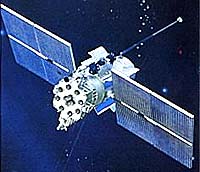 |
Berlin, Germany (SPX) Sep 22, 2009 A combination of small satellites can, with innovative methods, use the signals of the navigation satellite systems GPS and Galileo to significantly improve remote sensing of the System Earth. In September the results of a scientific feasibility study on the first MicroGEM satellites, jointly carried out by the Technical University Berlin and the GFZ - German Research Centre for Geosciences, were presented in Berlin. The study was supported by the TSB Technology Foundation Berlin and the Helmholtz Centre GFZ. MicroGEM (Microsatellites for GNSS Earth Monitoring) represents satellites with a mass of approx.100 kilograms for monitoring of the Earth. Such small satellites represent a relatively cost effective platform for scientific instruments. GNSS stands for Global Navigation Satellite System, a compendium of the satellite navigation system GPS and, in future, Galileo. With the GFZ-satellite missions CHAMP (CHAllenging Minisatellite Payload) and GRACE (Gravity Recovery And Climate Experiment) such, satellite-based innovative remote sensing technologies have been successfully employed during the past years. MicroGEM links in with these missions and will, for the first time, use the signals from the future Galileo-satellites for the GNSS-supported atmospheric and ionospheric remote sensing on a global scale. Thus, significant improvements in his method can be expected. In addition GNSS-signals for the remote sensing of ocean and ice surface will be employed for the first time. The particular technological challenge of MicroGEM lies in the fact that this small satellite mission shall serve as a predecessor for future multi-satellite systems with scientific GNSS-receivers as satellite payload. With such constellations the number of measurements can be considerable increased and an improved global coverage can be achieved. In close cooperation between scientific institutes and regional industry the foundation has been laid for a project whose name can also be translated as "Small Gem". The MicroGEM-Project brings together proven technique with innovation in a way which allows for new scientific results to be obtained at minimum technological risk. Work to date has clearly shown that available aerospace expertise in science and industry in the Region of Berlin/Brandenburg can, in close cooperation, be used very effectively and successfully. Share This Article With Planet Earth
Related Links Helmholtz Association of German Research Centres GPS Applications, Technology and Suppliers
 Russia To Launch 3 Glonass Satellites
Russia To Launch 3 Glonass SatellitesMoscow, Russia (RIA Novosti) Sep 16, 2009 Russia will launch a Proton-M carrier rocket on September 25 from the Baikonur space center in Kazakhstan to orbit three Glonass navigation satellites, Russia's Federal Space Agency Roscosmos said on Tuesday. Glonass - the Global Navigation Satellite System - is the Russian equivalent of the U.S. Global Positioning System, or GPS, and is designed for both military and civilian use. Both ... read more |
|
| The content herein, unless otherwise known to be public domain, are Copyright 1995-2009 - SpaceDaily. AFP and UPI Wire Stories are copyright Agence France-Presse and United Press International. ESA Portal Reports are copyright European Space Agency. All NASA sourced material is public domain. Additional copyrights may apply in whole or part to other bona fide parties. Advertising does not imply endorsement,agreement or approval of any opinions, statements or information provided by SpaceDaily on any Web page published or hosted by SpaceDaily. Privacy Statement |